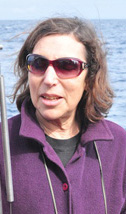Ludwick Lecture to Feature California Oceanographer
March 21, 2013
 Lisa Levin
Lisa Levin
Lisa Levin, a California-based biological oceanographer known for her probes of the deep ocean and for work involving climate change, will be the guest presenter for Old Dominion University's 2013 Ludwick Lecture in April.
This is the 26th anniversary of the lecture program organized by ODU's Department of Ocean, Earth and Atmospheric Sciences (OEAS). The series is named for Jack Ludwick, former director of the Institute of Oceanography at ODU.
The public is invited to attend this free lecture, which will begin at 3 p.m. Thursday, April 11, in Room 200 of the Oceanography and Physical Sciences Building. The title of the talk will be "Biodiversity, Climate Change and Human Exploitation in the Deep Ocean."
Levin, a professor with Scripps Institution of Oceanography at the University of California, San Diego, has multiple research programs that encompass coastal wetlands, continental margins and the deep sea. Her broad-ranging interests include anoxia and its biogeochemical consequences, ocean exploration, ocean conservation and climate change.
She will be on the campus from Wednesday evening until Friday evening and in addition to the formal lecture, her schedule will include meetings with faculty, students and OEAS alumni; tours of the department and university; and an informal seminar focusing on continental margins and climate change. Anyone interested in meeting with Levin before or after the Ludwick Lecture should contact Fred Dobbs, OEAS professor, at fdobbs@odu.edu.
"Over the past 50 years our view of the deep sea has changed dramatically," Levin wrote in a summary of the lecture she will give. "Once considered homogenous and monotonous, we now recognize that the deep sea holds tremendous habitat heterogeneity from a wealth of topographic, hydrographic, geochemical and biological sources. This heterogeneity represents a major source of biodiversity, which is key to effective functioning of deep-sea ecosystems.
"The discovery of novel assemblages and ecosystems in recent decades has been accompanied by an expanded human presence in the form of fisheries, energy extraction, bioprospecting and minerals mining. In many cases the destructive consequences of these activities may outpace our rate of exploration and knowledge acquisition," she noted.
"Simultaneously, climate change-induced warming, acidification and deoxygenation are also likely to alter the ability of deep-sea ecosystems to provide key services and recover from disturbance. This talk will discuss the challenges and choices needed to maintain the integrity of deep-sea biodiversity and its functions."

